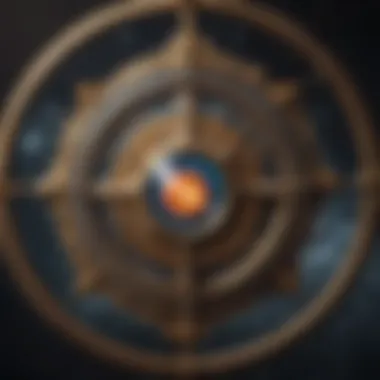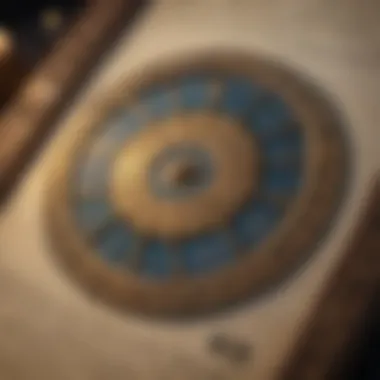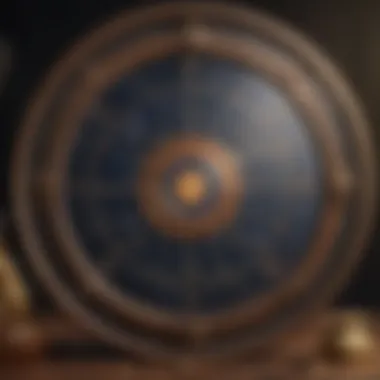The Impact of Daily Astrology and Horoscopes on Modern Living


Intro
Astrology serves as a guide for many individuals seeking insight into their lives. From personal growth to decision making, daily horoscopes and cosmic alignments influence many modern interactions. Yet, understanding the specifics can be complex. The goal of this article is to unravel these intricacies and demonstrate how astrology impacts contemporary existence.
Zodiac Profiles
Zodiac signs represent distinct energies and characteristics. Each sign encompasses unique personality traits, offers strengths, and exhibits weaknesses. A deep understanding of astrological profiles can illuminate paths for personal development and relationships.
Overview of Each Sign
The twelve zodiac signs include Aries, Taurus, Gemini, Cancer, Leo, Virgo, Libra, Scorpio, Sagittarius, Capricorn, Aquarius, and Pisces. Each sign is tied to specific dates and embodies particular qualities, shaping the way individuals interact with the world.
Personality Traits
- Aries: Confident, ambitious, but can be impulsive.
- Taurus: Practical, reliable, and can be stubborn.
- Gemini: Adaptable, curious, yet may struggle with commitment.
- Cancer: Nurturing, intuitive, tends to be sensitive.
- Leo: Charismatic, enthusiastic, and can be egotistical.
- Virgo: Analytical, detail-oriented, may be overly critical.
- Libra: Diplomatic, social, and can be indecisive.
- Scorpio: Passionate, resourceful, but often secretive.
- Sagittarius: Adventurous, optimistic, may be careless.
- Capricorn: Disciplined, responsible, can be pessimistic.
- Aquarius: Innovative, independent, may be aloof.
- Pisces: Compassionate, artistic, but can be escapist.
Strengths and Weaknesses
Knowing one’s strengths and weaknesses can aid in personal development. For instance, while an Aries’ confidence can propel them into leadership roles, their impulsive nature may lead to hasty decisions. In contrast, a Virgo’s analytical thinking is valuable in problem-solving, yet their critical tendencies can strain relationships. Each sign’s strengths and weaknesses play a pivotal role in establishing a balanced life.
Compatibility Insights
Astrology is not only about the individual; it also encompasses interactions with others. Understanding compatibility based on zodiac signs helps foster healthier relationships.
Love and Relationships
Astrological compatibility can indicate potential harmony between partners. For example, fire signs like Leo and Sagittarius often ignite passionate connections, while earth signs like Taurus and Capricorn may build strong foundations through stability.
Friendship Compatibility
Friendships can also be influenced by astrological signs. Air signs such as Gemini and Libra often connect over shared ideas, while water signs like Cancer and Scorpio may bond over emotional depth.
Workplace Dynamics
In a professional setting, knowledge of astrological compatibilities can enhance teamwork. Taurus may thrive in steady environments, whereas a Sagittarius may prefer dynamic roles. Recognizing these patterns can lead to improved communication and productivity among colleagues.
Astrological Events
Astrology offers insights into cycles that affect everyday life. Understanding these events can enrich personal insight and readiness for challenges.
Monthly/Weekly Horoscope Breakdown
Horoscopes provide predictions based on celestial movements. Weekly and monthly horoscopes can guide planning, highlighting potential opportunities or obstacles ahead. Regular consultation can assist in aligning actions with astrological influences.
Notable Celestial Events
Celestial events, such as eclipses or planetary retrogrades, are vital markers. They often signal significant shifts or turning points. Being aware of these events helps in preparing for changes that may arise.
How to Prepare for Astrological Shifts
Preparation involves aligning personal goals with these astrological insights. Setting intentions during new moons or creating plans around planetary movements can enhance purpose and direction in daily activities.
Understanding astrology empowers individuals to navigate life's complexities with awareness.
Understanding Daily Astrology
Understanding daily astrology is essential in today's context, where individuals seek guidance and insight into their lives through celestial influences. This interest in daily astrology reflects a desire for self-awareness and personalized advice in the fast-paced world. Daily astrology often claims to provide clarity in decision-making and a means to navigate relationships and personal growth.
Definition and Scope
Daily astrology refers to the practice of interpreting astrological positions and movements of celestial bodies to provide insights on everyday life. These interpretations can help individuals understand their potential, challenges, and opportunities based on the alignment of planets, zodiac signs, and houses at any given moment. The scope includes analyzing how these astrological elements interact with personal factors, such as natal charts, to create meaningful predictions for the day ahead.


Historical Overview
Astrology's roots can be traced back thousands of years to ancient civilizations, where it served as a tool for farmers, leaders, and everyday people. In many cultures, the movements of celestial bodies were observed for guidance in agriculture and governance. The practice transformed over time, giving rise to various schools of thought. Today, daily astrology has evolved into a popular practice, often simplified in formats like horoscopes found in newspapers and online platforms. This historical context illustrates how daily astrology has grown from a specialized field to a mainstream aspect of modern life, influencing how individuals perceive their day-to-day experiences.
Astrological Components
Understanding the components of astrology is crucial for interpreting daily horoscopes. The three primary components are planets, zodiac signs, and houses. Each carries unique attributes and influences.
Planets
In astrology, planets symbolize different aspects of human experience and personality. Each planet's position can indicate the nature of energies influencing an individual on any given day. For example, Venus is associated with love and relationships, while Mars relates to ambition and action. This diverse range of influences makes planets a valuable part of daily astrological readings, allowing individuals to align their actions with prevailing energies. Moreover, understanding planetary movements helps in recognizing potent times for various endeavors.
Zodiac Signs
The twelve zodiac signs offer a framework for understanding individual personalities and behaviors. Each sign represents specific traits and tendencies. For instance, Aries is known for its assertiveness, while Pisces is often seen as intuitive and empathetic. By recognizing the unique characteristics of each sign, individuals can gain insights into themselves and their interactions with others. This understanding is beneficial to daily astrology, as it allows for tailored predictions based on sign compatibility and positions, enhancing interpersonal dynamics.
Houses
Houses in astrology divide the sky into twelve segments, each connected to different life areas, such as career, relationships, and home. This division emphasizes the importance of context when interpreting transits and celestial events. For example, if a significant planetary movement occurs in the tenth house, it may indicate changes or opportunities in one's career. The cusps of houses signify transitions, influencing how astrological energy manifests in everyday life. Understanding houses aids individuals in pinpointing areas requiring attention and development, aligning them more closely with their personal goals.
The Components of a Horoscope
Understanding the components of a horoscope is essential for anyone interested in astrology. Each part offers insights into a person’s character, potential challenges, and opportunities. A horoscope serves not only as a tool for self-reflection but also as a practical guide in daily life. Thus, grasping its components can enhance one's decision-making and personal growth journey.
Natal Charts
A natal chart, or birth chart, is a snapshot of the sky at the exact moment and location of an individual's birth. This chart provides a unique window into a person's personality, strengths, weaknesses, and life patterns. Each element in the chart, including planets, signs, and houses, has its own significance. For example, the position of the Sun represents one's core essence, while the Moon might reveal emotional responses.
The natal chart acts as a blueprint for understanding how astrological influences shape life experiences. By analyzing planetary positions and angles, individuals can gain clarity on their behaviors and motivations. Furthermore, understanding the natal chart allows for more informed decisions in life, such as career choices and relationship dynamics.
Transits and Progressions
Transits refer to the ongoing movements of planets in real-time, and how they interact with positions in the natal chart. Each transit can trigger various events or shifts in one's life. For instance, when Saturn transits over a person's natal Sun, it may symbolize a period of increased responsibility or structural changes.
Progressions, on the other hand, represent a technique that advances the natal chart to reflect the evolving nature of time. This method allows for a deeper understanding of internal growth and personal development. By studying transits and progressions, individuals can anticipate changes and align their actions with celestial influences, fostering a proactive approach to life.
The Influence of Aspects
Aspects are angles formed between planets in the natal chart. They play a crucial role in interpreting the dynamics between different celestial bodies. Common aspects include conjunctions, squares, trines, and oppositions. Each aspect carries its own energy, which can either support or challenge the individual.
For example, a harmonious trine between Venus and Jupiter may suggest ease in relationships and a general sense of well-being. Conversely, a square between Mars and Saturn could indicate internal conflict or obstacles that need to be faced. By understanding aspects, individuals can recognize patterns and themes in their lives, guiding them toward informed choices.
Daily Horoscopes Explained
Daily horoscopes interpret astrological insights for everyday application. They serve as a daily guide, helping individuals navigate their day with a sense of direction. The importance lies in their potential to illuminate choices and provide a broader perspective on life's events. While many embrace them, others question their validity. Understanding this dynamic can enrich one's personal experience and decision-making.
What Constitutes a Daily Horoscope
A daily horoscope typically consists of a brief interpretation of celestial movements related to the zodiac signs. It usually encompasses the influence of the Moon, Sun, and significant planetary shifts that occur daily. Horoscopes can be categorized into:
- Sun Sign Horoscopes: These focus on the zodiac sign based on the birth date. They are the most common type, often published in newspapers and online.
- Personalized Horoscopes: These delve deeper, considering the unique natal chart of the individual, making predictions more tailored and specific.
- Short-term Forecasts: These are based on the current astrological climate, providing immediate insights that can influence the day's activities.
By summarizing planetary alignments and aspects, the daily horoscope encourages mindfulness and thoughtfulness in the reader's approach to their day.
Sources and Authenticity
The authenticity of daily horoscopes can vary significantly. Sources range from reputable astrologers with years of experience to random online generators without substantial foundation in astrology. To evaluate the quality of a horoscope, consider:
- Astrologer’s Credentials: Experienced practitioners like Susan Miller and Astrodienst typically provide reliable forecasts.
- Research and Publications: Academic texts or well-researched articles often give more depth than casual monthly or daily predictions.
- Peer Review and Feedback: Websites that allow community contributions may not always maintain high standards, so be wary of crowdsourced content.
Always check the source before placing weight on their predictions.


Interpreting Predictions
Interpreting daily horoscopes requires mindfulness and an understanding of its nuances.
- General Insight: Daily horoscopes offer a snapshot of current celestial events. Recognizing that these general forecasts may not apply to every individual is essential.
- Personal Resonance: Readers should consider their personal experiences and how predictions align with their current circumstances. Not all advice will connect with every person, given the diverse human experience.
- Use of Intuition: The interpretation also involves intuition and personal feelings about the advice given. Some people may find certain aspects resonate more deeply, while others may dismiss them entirely.
Effective interpretation means taking the insights provided and contemplating how they relate to personal decisions and intentions. By combining astrological guidance with personal judgment, individuals can explore avenues for personal growth and choose paths that resonate with them.
Daily horoscopes bridge the gap between celestial wisdom and everyday life, making astrology relevant in a fast-paced world.
Psychological Aspects of Astrology
The realm of astrology is not only about celestial bodies and their positions. It significantly intersects with human psychology. Understanding the psychological aspects of astrology helps in revealing how individuals interpret and react to astrological insights in their daily lives. This section will address key elements such as cognitive biases, the placebo effect, and self-reflection, essential for grasping how astrology influences modern life.
Cognitive Biases in Astrology
Cognitive biases play a crucial role in how individuals engage with astrological information. One common bias is confirmation bias. This is the tendency for people to favor information that aligns with their pre-existing beliefs while dismissing contrary evidence. In astrology, a person might notice that a horoscopes prediction aligns with an event in their life while ignoring instances when predictions were inaccurate. This reinforces their belief in astrological guidance.
Additionally, Barnum effect is relevant here. This psychological phenomenon indicates that individuals accept vague and general statements as personally meaningful. Astrological forecasts, often broad in nature, can easily fall into this category. This makes people feel personally connected to the predictions, regardless of their generality.
Recognizing these cognitive biases is important. It allows individuals to approach astrology with a balanced mindset, understanding that while it can offer insights, it may also mislead when taken too literally.
The Placebo Effect
The placebo effect underlines the power of belief in the context of astrology. Research shows that belief can produce real psychological and physiological changes. When individuals read their daily horoscopes and develop faith in their predictions, they may subconsciously influence their actions and thoughts, leading to outcomes that align with those predictions. Essentially, if a horoscope encourages optimism, that perspective can improve a person's mood and promote positive behaviors.
This effect has broader implications. It suggests that astrology can serve as more than mere entertainment; it can function as a tool for enhancing well-being. By tapping into a positive mindset instigated by astrological insight, individuals may navigate challenges with greater resilience. However, it's necessary to remain mindful not to rely solely on astrology for critical decision-making.
Self-Reflection and Personal Growth
Astrology can be a powerful medium for self-reflection. Daily horoscopes often prompt individuals to examine their feelings, behaviors, and motivations. This reflective process can foster personal growth, as individuals consider how astrological insights relate to their life experiences.
For many, astrology provides a language to articulate feelings and uncertainties. By framing personal situations through the lens of astrology, people can come to terms with various aspects of their lives more clearly. It can encourage open discussions about emotions and relationships, bolstering emotional intelligence.
Daily Astrology in Practical Life
Daily astrology is not just a conceptual idea; it plays a practical role in the lives of many people today. Understanding how to apply astrological insights can provide clarity and direction in various aspects of modern living. With a renewed interest in holistic approaches, many individuals are looking to astrology as a guide for their daily actions and choices.
Decision-Making
One of the most significant benefits of daily astrology is its potential to influence decision-making. Many individuals consult their daily horoscopes to gain insight into the best times for important actions. This can include deciding when to take risks, starting new ventures, or even making personal changes.
Astrology encourages self-awareness and helps individuals consider possible outcomes based on celestial events. This foresight might save time and help prevent unfavorable situations. Here are some points to consider:
- Alignment with Personal Cycles: Understanding one's natal chart can reveal personal cycles in relation to universal energies. This knowledge allows people to make decisions that are in harmony with their astrological influences.
- Timing: Astrological transits can suggest optimal times for action. For instance, those under a favorable lunar phase might initiate projects, while retrograde phases could signal times for reflection.
- Emotional Awareness: Daily astrology can highlight emotional trends, helping individuals respond appropriately in personal and professional situations.
Career Guidance
In the professional realm, astrology can offer valuable insights. Many individuals leverage their horoscopes to navigate their careers. Here, astrology acts as a tool for clarity and motivation.
- Identifying Strengths: By understanding zodiac signs and planetary positions, one can identify innate talents and strengths. For example, a native with strong Capricorn placements might excel in structured and grind-based jobs.
- Navigating Workplace Dynamics: Daily horoscopes can provide caution or encouragement, influencing how individuals interact with colleagues. This can ultimately enhance workplace relationships and productivity.
- Timing for Job Changes: Astrological forecasts can guide when to seek promotions or change jobs. Certain periods are considered more favorable for career advancements or transitions.
Relationship Insights
Astrology provides a lens through which individuals can gain insights into their relational dynamics. Daily horoscopes can shed light on interactions with partners, friends, and even family members.
- Compatibility Analysis: Knowing one's zodiac sign offers perspectives on compatibility with others. Astrological charts can reveal areas of harmony or conflict.
- Emotional Needs: Astrology can guide individuals to understand their emotional needs and those of their partners. Recognizing these aspects can foster better communication and empathy in relationships.
- Timing for Important Conversations: Just like in decision-making and career pursuits, certain times are more favorable for relationship discussions. Astrology can help in planning these moments to optimize outcomes.
Understanding daily astrology offers valuable tools for navigating life's complexities. By applying astrological insights, individuals can enhance decision-making, guide their careers, and deepen relationships.
In summary, daily astrology is not a whimsical concept but rather a practical resource. When utilized thoughtfully, it can yield beneficial outcomes in personal and professional realms.


Critiques of Astrology
Skepticism and Validity
Skepticism toward astrology often stems from its predictive nature. Critics argue that astrological claims lack empirical evidence, suggesting that they should be dismissed as pseudoscience. This discussion is vital for understanding the broader implications of astrology in society. Individuals relying heavily on astrological guidance may overlook scientific reasoning, leading to potentially poor decision-making. Skeptics frequently highlight the absence of mechanisms explaining how celestial events influence human behavior. This challenge to validity questions whether astrology can be a reliable source of insight.
Scientific Perspectives
From a scientific angle, astrology faces rigorous scrutiny. Researchers point out that replicated studies have failed to demonstrate a correlation between astrological predictions and actual outcomes. Scientists like Carl Sagan previously argued that astrological predictions often rely on vague or general statements, making them easy to interpret positively. Moreover, concepts like confirmation bias illustrate how individuals selectively remember successful predictions while ignoring inaccurate ones. Understanding these perspectives fosters a more nuanced discussion about the role astrology plays in modern decision-making.
Personal Responsibility
The critique surrounding astrology also touches on the theme of personal responsibility. Relying too heavily on astrological guidance may foster a mindset where individuals defer accountability for their choices. This approach overlooks the importance of personal agency in shaping one’s life. Encouraging a balanced perspective on astrology means advocating for its use as a reflective tool rather than a deterministic force. Recognizing the limitations of astrology allows individuals to integrate it in a way that complements their decision-making process without ceding control of their fate.
It is crucial to navigate feelings towards astrology thoughtfully, balancing belief with rational evaluation.
The Future of Astrology
The future of astrology is rooted in both its resilience and adaptability to modern society's needs. In an age dominated by technology and rapid changes, astrology remains relevant. The interplay between daily horoscopes and astrological insights is becoming an essential tool for many looking to understand themselves and their surroundings. This section will cover significant aspects that shape this future, emphasizing technological integration, wellness, and audience expansion.
Technological Integration
Technological advancements are reshaping numerous aspects of life, and astrology is not an exception. Mobile applications, such as Co–Star and The Pattern, permit users to receive daily horoscopes at their fingertips. These platforms use artificial intelligence to provide personalized readings. This trend suggests that astrology will increasingly rely on technology for interpretation and dissemination.
Additionally, social media channels like Instagram and TikTok have created vibrant communities of astrology enthusiasts. Users frequently share insights, memes, and personalized content, making astrology more accessible. This integration is significant as it fosters a sense of belonging, drawing younger generations into astrological discussions.
Moreover, the possibility of incorporating virtual reality could enrich the astrological experience. Imagine an immersive environment where individuals can explore their charts and understand celestial movements in a three-dimensional space. Such innovations could greatly enhance engagement and attract new audiences.
Astrology and Wellness
Astrology's future is not solely dependent on technology but also its potential role in wellness. As society becomes increasingly aware of mental health, many are turning to holistic methods for personal growth. Astrology often provides a framework for self-exploration and understanding behavior patterns. It encourages individuals to reflect on their lives and relationships.
Integrating astrology into wellness practices can offer a unique perspective. Therapeutic approaches using astrological insights might help individuals navigate their emotional challenges. For example, a person experiencing stress might consult their natal chart to explore areas of struggle. This understanding can be instrumental in personal development, guiding their decisions toward balance and fulfillment.
Furthermore, practices such as astrology-based meditation or journaling are gaining traction. These methods promote mindfulness and allow individuals to set intentions aligned with their astrological themes.
Expanding the Audience
The future of astrology also lies in its ability to reach a diverse audience. While traditionally associated with specific cultural or demographic groups, there is now a broadening scope. Many young adults and individuals from various backgrounds are becoming increasingly interested in astrology.
Efforts to demystify astrology can aid in expanding its audience. Educational platforms and webinars can provide clear and informative resources for beginners. This accessibility fosters curiosity and encourages deeper exploration of astrological practices.
Furthermore, as astrology intermingles with diverse disciplines such as psychology, ecology, and sociology, it becomes more relevant across different fields. The dialogue can engage those who may not have previously considered astrology as a serious subject, making it more inclusive.
“The integration of technology with astrology not only modernizes the field but enhances its ability to connect with people across cultures.”
Finale
The conclusion serves as a pivotal point in examining the principles and implications of daily astrology and horoscopes in modern life. It encapsulates the significance of astrological insights and their potential to assist individuals in navigating their everyday challenges. By synthesizing the key elements discussed throughout the article, one gains a clearer vision of how astrology can shape one's perspective and choices.
Summarizing Key Insights
Astrology offers more than just predictions; it provides a framework for understanding personal experiences. Some of the highlighted points are:
- Understanding oneself: Through natal charts, individuals can uncover aspects of personality and behavior.
- Decision-making: Daily horoscopes can offer guidance on critical decisions, aligning choices with astrological insights.
- Psychological impact: The influences of astrology can prompt self-reflection and encourage personal growth.
- Cultural relevance: Astrology has evolved from ancient practices to a mainstream consideration in contemporary life.
These key insights signal that astrology is not purely mystical, but a tool for empowerment and self-awareness.
Final Thoughts on Daily Astrology
Daily astrology and horoscopes continue to resonate deeply in our society. They address universal human questions and uncertainties, guiding individuals through complex emotional landscapes. The rise of technology further bridges the gap, making astrological knowledge more accessible.
Astrology does not claim to dictate fate, but it encourages individuals to align their actions with universal patterns. By acknowledging both its limitations and benefits, one can derive practical wisdom from astrology. As our understanding of the cosmos evolves, so too does the application of astrological insights, supporting holistic living approaches that embrace the interconnectedness of life.
"Astrology unveils the patterns of the universe, inviting people to engage with their intrinsic journey."
In the end, daily astrology serves as a reminder of our connection to the cosmos and each other, offering a framework for reflection and potential growth.



